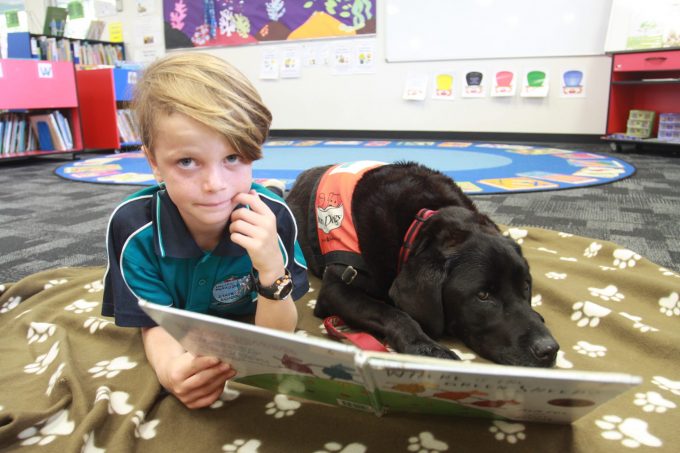Fairy tales and furry tails as students read to dogs.

When Petra Westphal adopted a greyhound named Holly, she knew the dog was destined to be more than a house pet.
In Holly’s past, she had spent three months as a blood donor before being surrendered to Friends of the Hound.
“I thought she was special and I wanted to do something with her,” explains Petra.
“She was one of those calm, placid dogs who loves people, loves life and gets on with everyone.
“She enjoys socialising and being around people.”
Holly is now an accredited ‘Story Dog’ and visits schools to sit (or lie down) and listen to children as they read books.
The Story Dogs reading support program is not-for-profit and operated entirely by volunteers. Each week across Australia, more than 1700 students who lack confidence with reading settle down next to their Story Dog and read to the pooch.
Story Dogs’ mission is to “make reading fun” so children become lifelong readers. It operates on the philosophy that dogs offer a non-judgemental setting that enables children to have more focus and confidence.
“The accepting, loving nature of dogs gives this program its magic and helps children relax, open up, try harder and have fun while reading to a friendly, calm dog,” the Story Dogs website says.
Petra, who is the volunteer Story Dogs co-ordinator for Sunshine Coast North, says students learn to let go of their fears and get immersed in the story, rather than stress about the act of reading out loud.
“It’s about having fun with books; it’s about the story and not worrying about the words but what’s happening in the story and looking at the pictures and it being fun and enjoyable,” she says.
“And the dogs get a lot of pats and cuddles.”
On a Thursday morning at Pacific Paradise State School on the Sunshine Coast, retiree Janelle Lockhart is walking to school in the rain with her 11-year-old black Labrador Kara.
Janelle became a volunteer after reading an article in her local community newspaper. She is a self-confessed dog lover who wanted to contribute in her retirement.
(Story Dogs’ growth happens through more people signing up as volunteers.)
Janelle deliberately arrives just after students have settled into classrooms so she can walk through the grounds without drawing too much attention to Kara.
“What I didn’t realise is that Kara would get so much enjoyment out of it,” says Janelle.
“She gets excited when she knows we’re coming here.”
On this particularly rainy Thursday Janelle has decided to read in the library. She pours Kara a small dish of water and the pair walk together to collect the first student of the morning, seven-year-old Sunny.
Sunny flips through the book selection and begins reading while Kara stretches out on her side and falls sleep on the rug.
The old black dog perks up when the book is finished and she knows it’s time for a game in which Sunny hides a dog treat in the room and Kara sniffs it out.
Pacific Paradise principal Margie Burrell says Story Dogs “has been the best thing imaginable for our kids”.
“We just love our Story Dogs and we absolutely have seen benefits to the kids,” says Margie.
“Every kid in school would love to participate but we aim for kids who lack confidence in reading, usually around grade 2 so they have some maturity.
“They might lack confidence or don’t like others to listen to them read.”
Margie says students learn to relax when reading to a Story Dog but they also develop a good relationship with the animal’s handler.
“The dogs don’t care if you stumble over a word. A dog has no criticism, no judgement. They just love listening to the sound of your voice,” she says.
“The kids can learn and pat the dogs and the dogs look at them as if they are terrific.”
Story Dogs relies on volunteers offering their time. Handlers and pets undergo training and accreditation and must meet certain requirements before they can begin reading with students.
The program is free to schools however Story Dogs relies on dog sponsorships, fundraising and donations to pay for overheads such as public liability insurance.
The program is free but it costs Story Dogs about $500 a year to put a Dog Team into a primary school.
To become a volunteer or find out about Story Dogs for your school, visit storydogs.org.au.
Interesting Facts
Story Dogs help more than 1720 children each week
There are more than 354 volunteer dog teams
Dog teams are in 97 schools in all states and territories except NT
About 57% of dogs teams are fully sponsored






